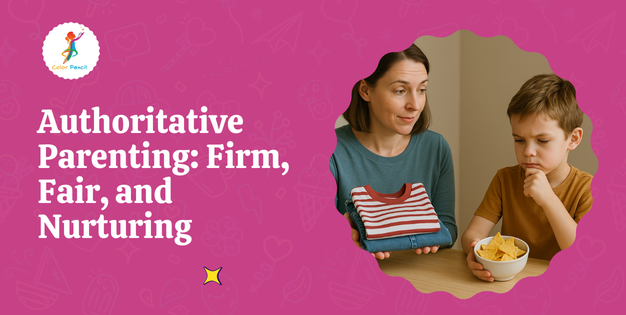
Top 10 Flashcard Combos for Holistic Toddler Learning
Did you know that up to 80% of a toddler’s brain develops in the first five years? As a parent, you’re likely eager to give

Raising Confident, Responsible, and Emotionally Healthy Children
Researchers and child development experts identify authoritative parenting as one of the most effective parenting styles which exists among many other methods. The parenting style achieves a perfect equilibrium between firm rules and strong bonds by implementing both high parental responsiveness and high standards.
Authoritative parents establish firm guidelines without subscribing to either extreme in parenting. Through consistent compassionate guidance they create spaces which help children develop under support while maintaining respect along with encouragement towards growth.

A well-balanced parenting approach features specific boundaries which pairs with supportive relationships accompanied by continuous communication. Parents establish clear rules for their children then consistently uphold these standards while staying open to conversations and warming toward their offspring.
This approach functions based on mutual respect between parents and children. Children under these parenting styles are obligated to follow guidelines but their unique experiences and emotional outlook receive recognition. Teaching occurs through implementing discipline rather than using it for punitive purposes.
Parents who adopt an authoritative style of parenting tend to select it for the following reasons:
According to this belief children develop best when their parents combine firmness with love.

When practiced consistently, authoritative parenting offers a wide range of positive outcomes for children:
These children are often well-equipped to face challenges with confidence and self-awareness.
While authoritative parenting is effective, it also comes with certain challenges:
This style works best when parents commit to both structure and empathy, even during challenging moments.
Children need to understand the rules and the reasons behind them. Communicate clearly and age-appropriately.
Follow through on expectations with fairness and predictability. Inconsistency can create confusion and test boundaries.
Allow children to make choices within limits. This builds confidence and decision-making skills.
Rather than punish, help your child understand the impact of their behavior and explore better alternatives.
Even when a child breaks a rule, acknowledge their feelings. Emotional validation strengthens the parent-child bond.
Make time for open conversations and shared experiences. Children are more likely to cooperate when they feel heard and respected.

This approach is particularly effective:
Feeling Overwhelmed? Let’s Talk! Join Our Parent Forum and Get Expert Advice & Support!
The approach of authoritative parenting provides an ideal leadership example which materializes through love-based relationships. This parenting approach pays homage to the child’s requirement of guidance and structure together with emotional support and leaves room for growth as well as independence.
When parents set clear expectations along with empathy and respect they guide their children into becoming capable, thoughtful and emotionally intelligent persons who grasp and live by values instead of merely following rules.